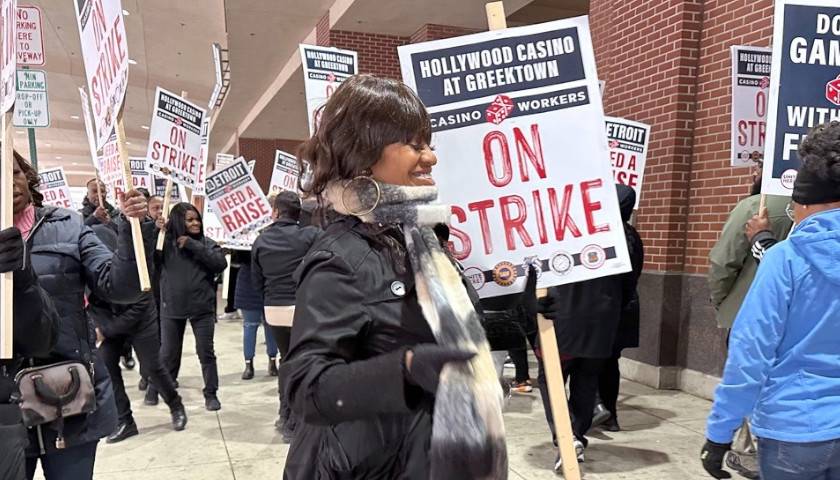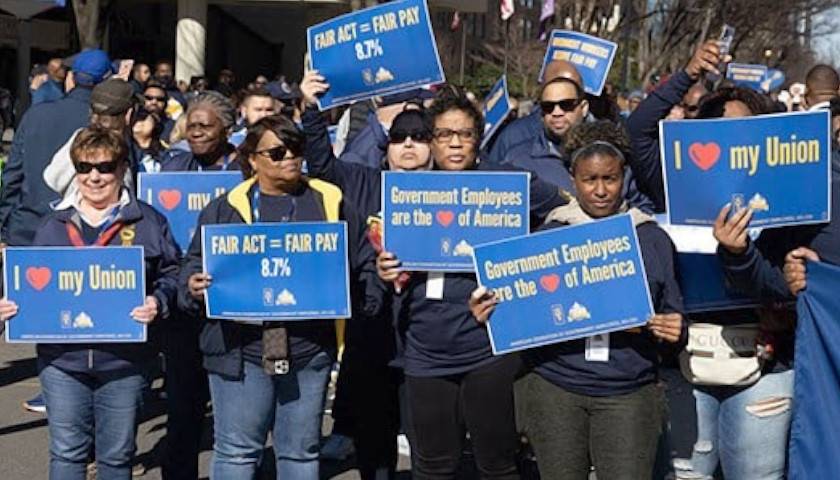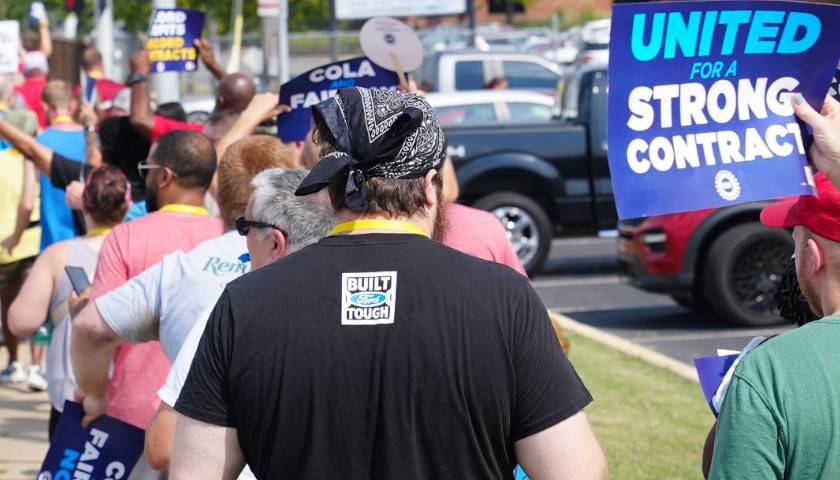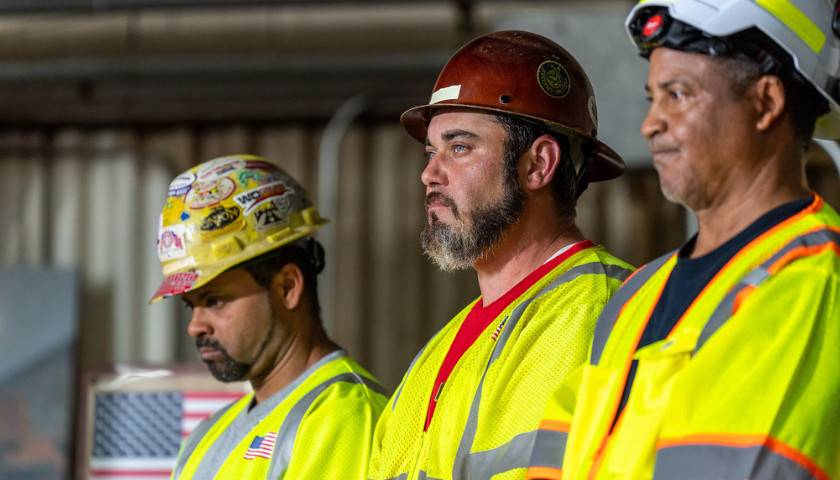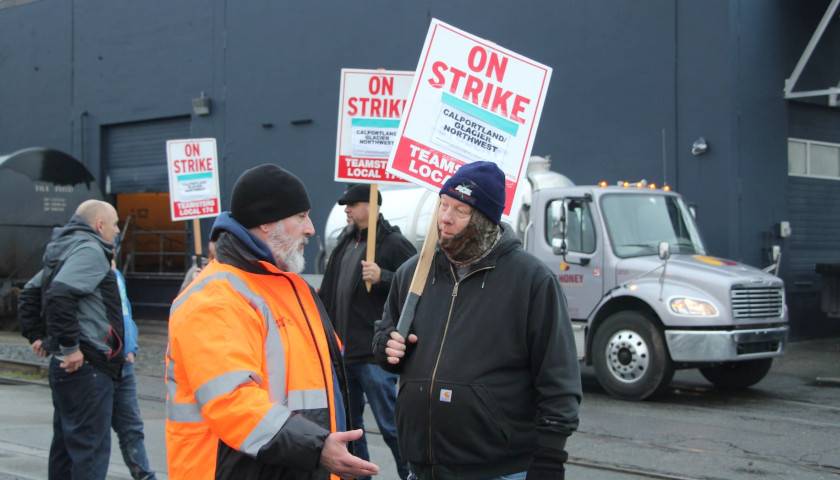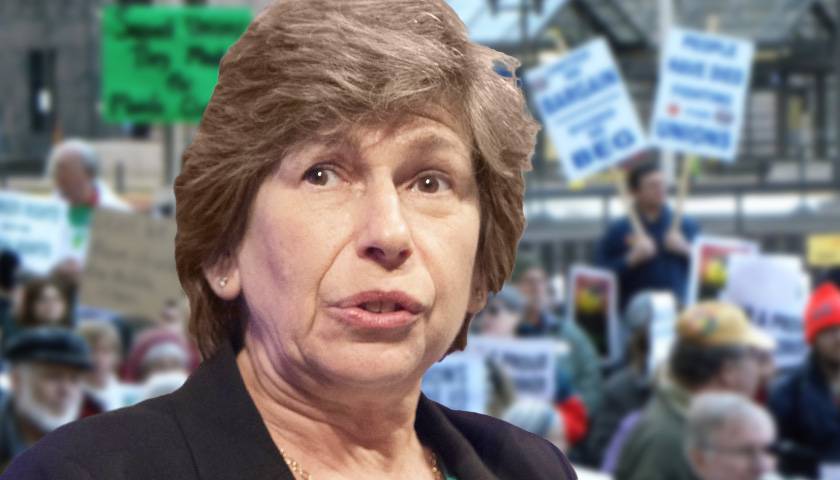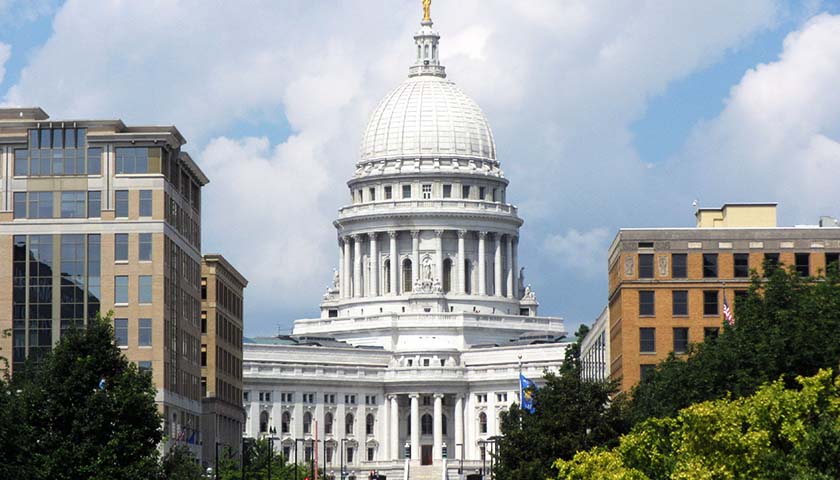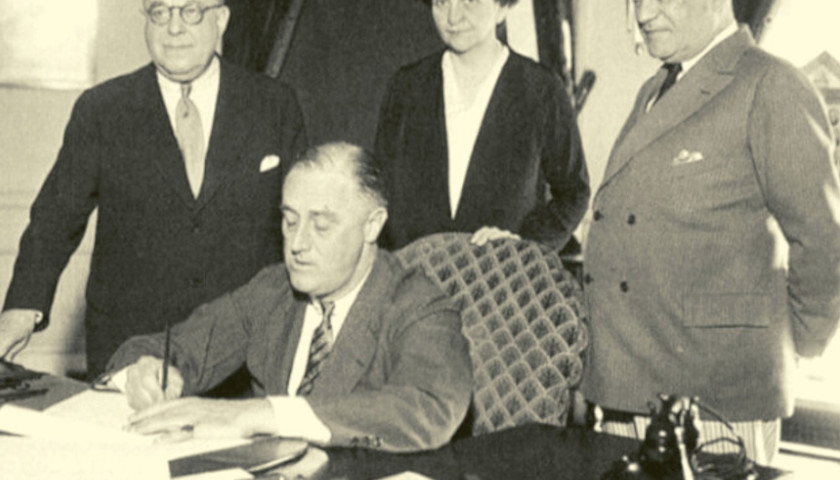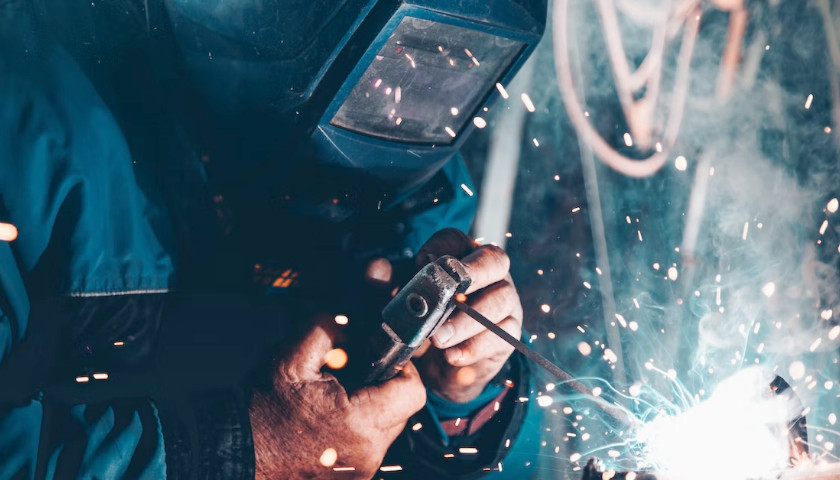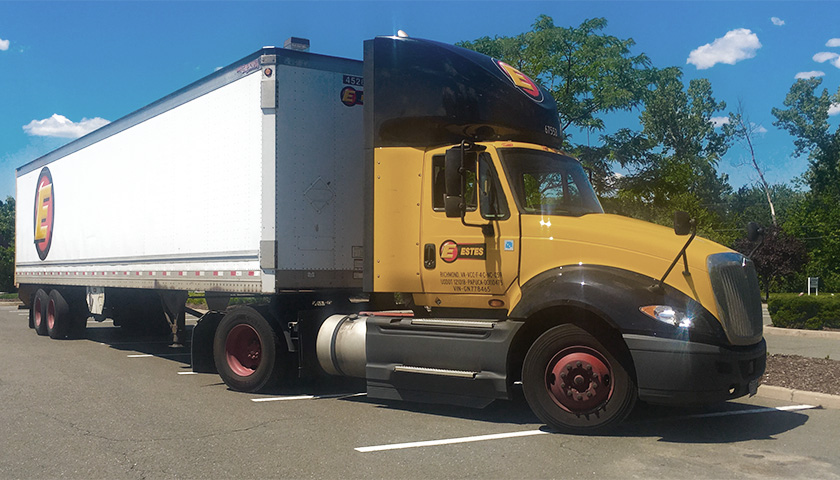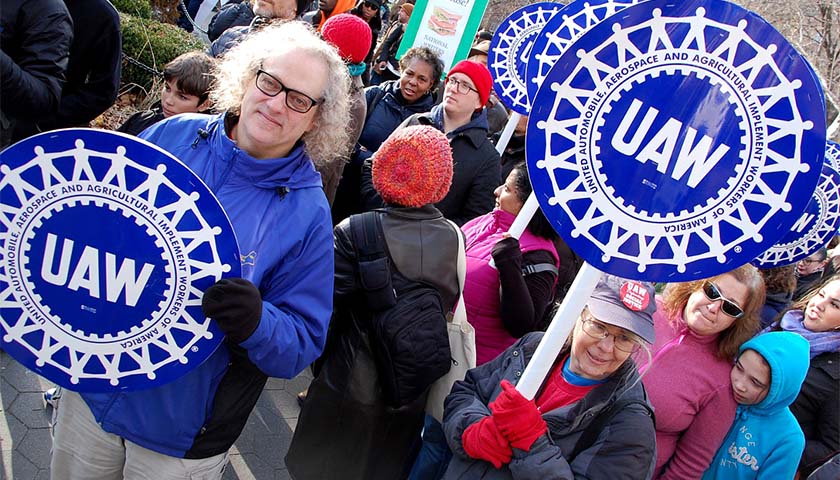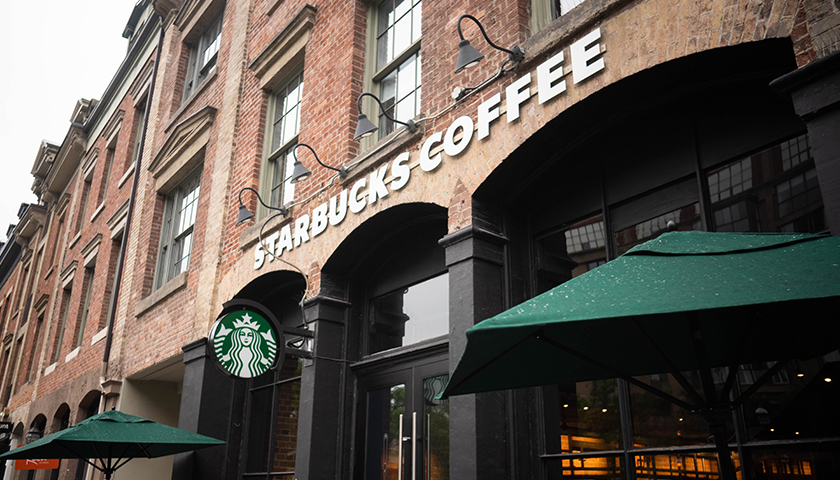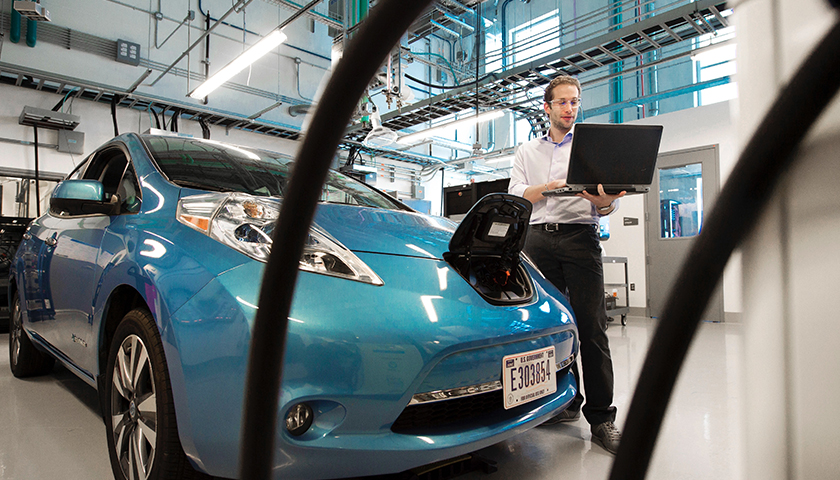As the school year nears completion, a quick look at recent developments shows an education system in turmoil. The unions are more political than ever, their demands are shameless, lawsuits against the establishment abound, and school choice is rapidly expanding.
Read MoreTag: Unions
Businesses Blast New Biden Rule Allowing Union Reps to Inspect Job Sites
Business groups are pushing back against a new Biden administration rule that would allow third-parties, including union representatives, to accompany federal inspectors of job sites.
The Occupational Safety and Health Administration issued the final rule earlier this year, but critics say the rule goes beyond safety needs and panders to unions and their recruitment efforts. The rule would apply even to job sites where workers have not unionized.
Read MoreCommentary: Reforming Private Sector Unions
Unlike public sector unions, which are inherently corrupt and need to be outlawed, private sector unions have a vital role to play in American society. But these unions have become coopted by the same special interests they were originally formed to oppose. The political agenda of America’s unions is almost exclusively leftist, and being part of America’s institutional “Left” is not what it used to be.
The biggest misconception in American politics today is that the political Left is fighting corporate power. Leftists may still attack corporate profits and demand corporations pay their “fair share,” but on every major issue affecting the economic freedom and prosperity of working families in America, these presumed antagonists are actually in perfect alignment.
Read MoreCommentary: Outlaw Public Sector Unions
Money doesn’t guarantee victory in political campaigns. For proof, look no further than Meg Whitman, the California billionaire who in 2010 squandered $179 million in her futile campaign to beat Jerry Brown and become that state’s next governor.
When money is married to institutional power, however, it makes all the difference. This is why, 10 years after the Whitman debacle, Mark Zuckerberg was able to purchase the presidential election outcome in 2020 for $419 million. Whitman’s money paid consultants and bought ads on television. Zuckerberg’s money went to supplement the activities of election offices in swing states – election offices that employed workers represented by unions that overwhelmingly favor Democrats over Republicans.
Read MoreHouse Dem Predicts Biden Will Intervene to Stop Strike Against Big Three Automakers
A House Democrat predicted Tuesday on an episode of Bloomberg’s podcast “Sound On” that President Joe Biden would intervene to avoid a major auto industry strike.
The United Auto Workers (UAW) is currently in negotiations with the Big Three automakers — Ford, General Motors and Stellantis — over employment contracts for unionized workers that are set to expire on Sept. 14. Virginia Democratic Rep. Don Beyer told “Sound On” host Joe Mathieu that he believes that Biden will prevent a strike between the Big Three and UAW by intervening in negotiations, citing past interventions in union negotiations.
Read MoreCommentary: What Unions Don’t Want You to Know This Labor Day
This Labor Day, the Biden administration and Big Labor will no doubt tout the alleged successes of President Joe Biden’s “whole of government” push to increase unionization in the workplace and unions’ modest successes in breaking into a few big corporations. But those stories will also leave a lot out. They’ll leave out the side of the story that unions don’t want workers to know.
That side of the story includes the fact that unionization reached an all-time low of 10.1 percent in 2022 (and only 6.0 percent among private sector workers) as worker satisfaction reached an all-time high of 62.3 percent (according to The Conference Board’s measure, which began in 1987). It also includes the fact that while non-union wages increased by 24 percent over the past five years, union wages rose by less than 17 percent.
Read MoreCommentary: Unions Have Betrayed America
Anyone suggesting there is no role for unions in America today might first consider a fact of history: more than a century ago, when oligarchs and the companies they owned had treated workers as if they were livestock, reduced to living in squalid pens with rationed food and water, it was unions that organized these workers to resist. It was unions who gave these workers back their humanity, and negotiated collective bargaining agreements and laws that eliminated child labor, enforced workplace safety, established an 8-hour work day, paid overtime, health benefits, and retirement pensions.
Read MoreCommentary: America Needs to Update Its Labor Union Laws
For years, labor unions have been exempt from the consequences of destroying private property. Would you like a higher wage or salary? Sounds good! So, how would you go about persuading your employer to give you a raise? Why not vandalize some of your employer’s property with your labor union, or at least threaten to do so unless the boss gives you the raise you want?
Let’s say you want to get hired for a certain job, but you are worried that another applicant might get the job you want. Should you slash the tires on the other person’s car and threaten to pound him with a baseball bat if he doesn’t disappear?
Read MoreCommentary: To Unions, Organizing Time Is Fine When It’s on the Taxpayers’ Dime
Randi Weingarten, the powerful president of the American Federation of Teachers, hasn’t been a working teacher in more than a quarter of a century.
Of the six years she spent teaching social studies, half of them appear to have been as a substitute. Yet despite the long absence from her short tenure in the classroom, the union leader described herself during a recent congressional hearing as being on leave from Brooklyn’s Clara Barton High School.
Read MoreFormer Wisconsin Governor Scott Walker to GOP Presidential Candidates: Strong Ideas Trump a Bold Record
As the crowded field of GOP presidential candidates jockey for position, former Wisconsin Governor Scott Walker has some advice: Go bold, or go home.
Walker knows.
Read MoreBig Labor Growing Bolder in Badger State with Potential for Liberal Majority on the Wisconsin Supreme Court
A longtime Wisconsin factory worker charges the United Steelworkers threatened to have her fired for seeking to leave the union.
It’s another brazen act by Badger State Big Labor, emboldened by a union-friendly governor and the prospects of the state Supreme Court taking a left turn, a worker’s freedom advocate tells The Wisconsin Daily Star.
Read MoreCommentary: Forgery Cases Give Supreme Court Opportunity to Hold Unions Accountable for Shady Tactics
In its landmark Janus v. AFSCME ruling four years ago, the U.S. Supreme Court struck down a decades-old precedent that 22 left-leaning states used to justify forcing millions of public employees to join or fund a labor union against their wishes. Despite this decision, several unions have used legal action—and illegal actions—to try to prevent employees and their dues from leaving.
Since the Janus decision, several hundred thousand government workers have parted company with their unions—and kept hundreds of millions of dues dollars in their own pockets—after deciding the association no longer made sense for themselves and their families.
Read MoreCommentary: The Monopoly Hiding in Plain Sight
With persistent inflation and growing concerns over a recession, pundits, policymakers, and the president have expressed concern about an alleged lack of competition lurking in the dark corners of the U.S. economy. As President Biden himself said, “capitalism without competition isn’t capitalism, it’s exploitation.” From Big Tech to baby food, both sides of the aisle are on the lookout for monopoly power. But sometimes the best place to hide is in plain sight.
Read MoreMajor Government Unions Lose over 200K Members
The top four public labor unions in the U.S. lost hundreds of thousands of members since a 2018 Supreme Court case that ruled government employees could not be forced to pay a union to keep their job, a new report shows that.
The Commonwealth Foundation released the report, which found that the top four public labor unions – AFT, AFSCME, NEA, and SEIU – lost nearly 219,000 members altogether since the Janus v. AFSCME ruling.
Read MoreCommentary: Workers Increasingly Favor Right-to-Work States
Union bosses and their apologists often grossly understate, or forget about altogether, regional cost-of-living differences when they are debating living standards in Right to Work states versus in forced-unionism states.
Read MoreCalifornia’s New Pro-Union Law Could Grind the Supply Chain to a Halt
California truckers are protesting across the state to express their disapproval of Assembly Bill (AB) 5, a new law backed by unions that reclassifies them as employees rather than independent contractors and could send shockwaves through an already-stressed supply chain.
The regulation was partly enacted to protect gig workers at companies like Uber and Lyft that hire independent contractors in large numbers without affording them the benefits given to employees, but will complicate or render illegal the current employment status of many of California’s approximately 70,000 independent truck owner-operators, The Wall Street Journal reported. The law will likely force some truckers out of the industry, thus lowering shipping capacity and raising prices for transporting cargo in the Golden State at a time when California ports have already experienced major supply-chain bottlenecks during the COVID-19 pandemic, CalMatters reported.
Read MoreCommentary: Unions Aligning with America First
After intense negotiations, the United Auto Workers secured a new agreement with Ford, General Motors, and their suppliers that effectively prohibits a vaccine mandate for employees by requiring only “voluntary” disclosure of vaccination status for union members. This hard-won validation for workers points to a larger opportunity for the America First movement and organized labor to acknowledge that they are natural allies.
On critical issues ranging from medical privacy to border security and foreign trade, the emerging populist and nationalist consensus of the New Right creates an obvious home for unionized Americans. The America First cause can, in turn, help revitalize private-sector unions and guarantee a more prosperous society for our country, with a stronger middle class through a better diffusion of economic and political power.
Read MorePennsylvania Republican Lawmaker: Election Integrity Belongs in the Workplace Too
Pennsylvania state Rep. Torren Ecker (R-Abbottstown) believes the guarantee of free and fair elections with secret balloting belongs not only in contests for public office but in votes over labor representation.
This week, he announced plans to introduce an amendment to the Pennsylvania Constitution intended to cement that guarantee in the Keystone State in anticipation of federal legislation aiming to strengthen labor unions.
Read MoreStarbucks Announces Wage Hikes Amidst Labor Struggles
Seattle-based Starbucks announced it will increase hourly wages next year as the coffee giant faces the dual pressures of unionization attempts and staffing shortages.
According to a press release from the company, starting in January of 2022, hourly employees with two or more years of service could see a 5% raise and those with five or more years of service could see a 10% raise.
By the summer of next year, the company says its average hourly pay will be $17, up from the current average of $14. Employees will make between $15 and $23 an hour across the country, depending on location and tenure.
The press release did not address what impact the moves will have on coffee prices.
Read MoreCommentary: Biden’s Electric Car Plan Means Rigging Manufacturing to Favor Unions
In a highly orchestrated and publicized White House gathering this month, President Biden presented a detailed plan for the development of a U.S. fleet of clean, high-mileage electric automobiles that would reduce reliance on gasoline and generate thousands of good union jobs. It’s a new, government-encouraged, taxpayer-subsidized auto world. The plan calls for U.S. auto production to become 50% electric by 2030. Today, the electric share stands at a paltry 2%.
Top leaders from Ford, GM, and Stellantis (formerly Fiat-Chrysler), along with environmentalists and governors, were prominently invited to share in the announcement. Yet the absence of any non-union, America-located auto producers was glaring. There were no representatives from Hyundai, Nissan, or Toyota – companies that have long produced popular vehicles within our borders and recently expressed some support for Biden’s goal. Also striking was the absence of Tesla’s Elon Musk, the world’s acknowledged leader in the electric car and battery revolution. Tesla is an American firm, but it is not unionized.
Read MoreCommentary: How Unions Could Save America
The general perception within Conservatism, Inc. and libertarian circles is that collective bargaining is a violation of the right of the individual to seek work without being compelled to join a union. That sounds good in principle, but there’s much more to the story.
A few years ago, the workers at a local grocery store chain in California went on strike. The reason they voted to strike was that management had implemented a new policy whereby most of the employees, including full-time career workers, had their hours reduced to fewer than 25 hours per week. At the same time, these employees had their health coverage taken away.
Read More


